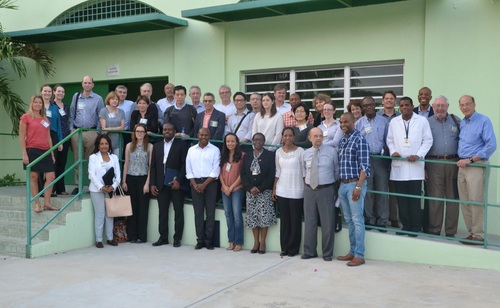Tuberculosis Research Unit Symposium
By CLAYTON LAUPUS Jan 25, 2016

The Center for Global Health and GHESKIO convened over 40 scientists and researchers in Port-au-Prince, Haiti for a symposium centered on the Tuberculosis Research Unit (TBRU) from January 10-12, 2016.
The TBRU is a research collaboration supported by the NIH that exists to develop new tuberculosis (TB) drugs to replace current therapies and aims to understand the biology of TB infection. This collaboration brings together researchers from six different institutions including Weill Cornell, Sloan Kettering Institute, Rockefeller University, among others, with clinical researchers in Haiti at GHESKIO Centers.
During the symposium at GHESKIO, both visiting and resident researchers provided updates on their current work ranging from active TB case findings in Port-au-Prince to new drug therapies for TB. The symposium and its focus are made even more significant by the White House’s recent National Action Plan. The National Action Plan was issued in order to deal with the growing number of cases of multidrug-resistant tuberculosis (MDR-TB) and extensively drug-resistant tuberculosis (XDR-TB). The targets of the National Action Plan require close work with the 10 countries most affected by MDR-TB to increase appropriate treatment of patients, to reduce the global incidence of TB, and to achieve very high treatment success rates for TB in high burden countries.
The National Action Plan was created to address the vast implied economic consequences that the United States healthcare system, and the global economy, will face if the prevalence of MDR-TB increases. The cost of treating one TB patient in the United States starts at about $17,000, jumps to $150,000 for a patient with MDR-TB, and then up to $482,000 for a patient with XDR-TB1. Projections from the United Kingdom’s All Party Parliamentary Group on Global TB show that over the next 35 years, 75 million people will die due to MDR-TB, and by 2050 this airborne infection could cost the global economy $16.7 trillion1.
Among the researchers at the TBRU symposium was Charles Vilbrun, MD, a physician at GHESKIO. Dr. Vilbrun studied the outcomes of MDR-TB patients enrolled in treatment and his study showed that from 2008-2013, the rate of treatment success increased from 50% to 89.4% while mortality rate decreased from 50% to 6.4%. The findings reported by researchers were exciting and presented opportunities that could combat the fact that only 10 percent of people with MDR-TB globally are treated successfully2. The work being done by these researchers aligns closely with the goals of the National Action Plan, particularly to accelerate basic and applied research in order to develop more efficient treatment.
Regardless of whether The White House moves forward with the National Action Plan the work of the TBRU will continue in order to create treatments and provide care to reduce the incidence of TB around the world. The National Action Plan as well as the continued work by the TBRU provide a clear blueprint as to what needs to be done going forward in order to combat tuberculosis.
[1] http://www.pdpfundersgroup.org/ewExternalFiles/APPG%20MDR-TB%20Report%20...
[2] http://www.who.int/tb/publications/global_report/en/
Weill Cornell Medicine Center for Global Health
Center for Global Health
420 East 70th Street, 4th Floor, Suite LH-455
New York, NY 10021
Phone: (646) 962-8140
Fax: (646) 962-0285

